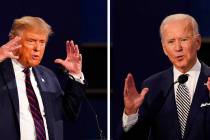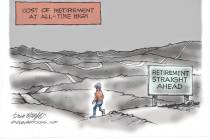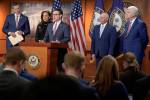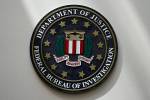A plea for (digital) privacy
When I send an email to my daughter’s teacher or store family photos with an online service, I consider those items private. To me, and I think to most people, our electronic memories are no less treasured than printed photographs or letters on paper. But federal law doesn’t provide for our digital communications the same privacy protections long afforded to our physical possessions. An outdated statute says that our digital lives can be searched by government officials without a warrant.
As Americans move more of their personal communications and important documents online, the time has come for Congress to update privacy protections to reflect the way we live today.
The federal law specifying rules for government access to our digital property is the Electronic Communications Privacy Act, or ECPA. It was written in 1986. That makes it even more outdated than a flip phone. ECPA says that government agents can access personal information stored online without probable cause to believe that a crime has been committed, using just a subpoena issued by a prosecutor, with no judicial review.
The result disfavors newer modes of storing and sharing data. Computer files stored in your home or office? They’re protected by the Constitution against government overreaching. Information stored on your smartphone? That’s also protected, thanks to a recent Supreme Court decision. The very same information stored with an online service provider? Not protected, according to ECPA. This doesn’t make sense.
Some day, I predict, the Supreme Court will make it clear that the Fourth Amendment protects our private communications, photos and calendars, whether they are stored in our homes or in the Internet “cloud” and available through our computers and smartphones.
Meanwhile, some federal agencies want direct access to your digital property without a warrant. And the courts can be slow to act when confronted with new technology.
Fortunately, there is momentum in Congress to reform ECPA. Bipartisan legislation has been introduced in both the House and Senate to bring the law up to date with the realities of the 21st century. The ECPA bills are supported by businesses large and small, and by advocacy groups across the ideological spectrum, a rarity in Washington these days.
Some regulatory agencies, led by the Securities and Exchange Commission, are blocking reform. These civil regulators want to get a power they have never had before, the power to bypass the targets of their investigations and instead go straight to online service providers to demand that they disclose the digital “property” stored on behalf of their customers.
A recent poll revealed that an overwhelming majority of Americans want online privacy. In Nevada, 70 percent said it is important that there be limits on how government agencies access private communications. When ECPA was explained to them, 88 percent of Nevadans agreed the law needed to be stronger, and 77 percent said they were more likely to vote for a candidate who supports stronger privacy standards.
Digital privacy is not only a personal right, but good business. In Nevada and nationwide, tech companies are creating jobs. America has been the global leader in developing the Internet “cloud” — online services providing free or low-cost digital storage for individuals and businesses. However, outdated laws can hold back innovation by decreasing confidence in online services. American companies have already lost contracts overseas because of fear of government surveillance.
Earlier this summer, a unanimous Supreme Court said, “Our answer to the question of what police must do before searching a cellphone seized incident to an arrest is … simple — get a warrant.” By passing bipartisan ECPA reform, Congress can give the same answer to the question of what government agents must do before forcing Internet services to disclose our emails, photos, and personal messages: Get a warrant.
Nuala O’Connor is president and chief executive officer of the Center for Democracy &Technology, a nonprofit, nonpartisan organization that defends liberties in the digital realm.























